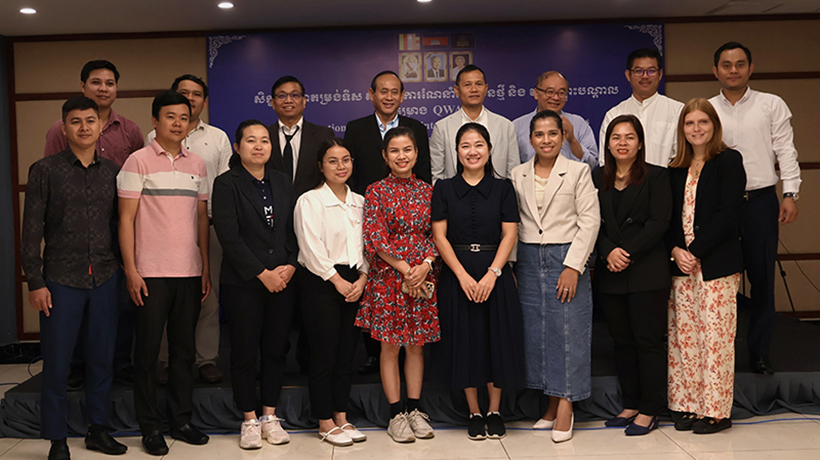News
Launching Phase II of the QWArS Program: strengthening AMR surveillance and collaboration in Cambodia and Laos

On September 20, 2024, to launch QWArS II (Qualifying Workforce on Antimicrobial Resistance Surveillance), the Mérieux Foundation held a one-day orientation workshop in Phnom Penh, Cambodia, to welcome new candidates and introduce them to the training program and its goals.
The orientation was opened with the esteemed presence of Dr. Sokunna SAU, Deputy Director of the Department of Hospital Services (DHS) at the Ministry of Health (MoH), Dr. San SORN, Deputy Director General of the General Directorate of Animal Health and Production (GDAHP) at the Ministry of Agriculture, Forestry and Fisheries (MAFF), and Dr. Chanthe THOR, Country Representative for The Mérieux Foundation. This workshop is an important milestone in the QWArS training program, fostering collaboration among stakeholders and strengthening the capacity of healthcare professionals in the fight against antimicrobial resistance (AMR).
The aim of the workshop was to introduce the program to the trainees and provide them with a valuable opportunity to present their expectations. Trainees will participate in the program to enhance their skills in pathogen identification and antimicrobial testing, improve collaboration between the human and animal health sectors in line with the One Health approach, and contribute to national projects focused on bacteriological and AMR testing.
This meeting provided an opportunity for trainees from Phase I to share their feedback on their previous experiences, discuss lessons learned, and suggest improvements for the upcoming phase.
Following this workshop, several important steps are planned. Training will begin in October, with the first two-day training session scheduled for October 8 and 9, 2024, followed by a second session on October 22 and 23, 2024. These sessions are designed to build on the knowledge gained during the workshop and further develop the skills of the participants. Participants in the microbiology course will be able to apply basic observation of morphology and characteristics of bacterial growth, use isolation methods and antimicrobial susceptibility testing (AST) in their own work, and implement maintenance techniques for their equipment. They will also learn to interpret and report test results and apply a technique for managing test results using WHONET as part of their data management training.
Trainees on the epidemiology training course will gain the ability to apply knowledge of outbreak design and sampling techniques, manage and analyze data and produce reports. They will also develop essential communication skills to work effectively with colleagues and other staff.
In addition, Phase II was launched in Laos with an orientation workshop on September 6, 2024. This workshop served to introduce new participants to the objectives of the program and set the stage for upcoming training initiatives in the country, furthering the program’s commitment to a collaborative One Health approach.
About QWarS
The QWArS program, led by the African Society for Laboratory Medicine (ASLM) and supported by the Fleming Fund, has successfully completed Phase I from 2020 to 2022. This initiative aims to improve antimicrobial resistance (AMR) surveillance in Cambodia and Laos by providing high-quality training in microbiology and epidemiology, benefiting both the human and animal health sectors.
In Cambodia, the program works with key partners including the Bureau of Medical Laboratory Services (BMLS), the General Directorate of Animal Health and Production (GDAHP), and the University of Health Sciences. The Mérieux Foundation has adeptly navigated the challenging environment, offering both virtual and face-to-face training that has received positive feedback from trainees and institutional partners.
The program emphasizes on a One Health approach and promotes collaboration between human and veterinary laboratory professionals. It aims to continuously improve the skills of microbiologists and epidemiologists at both central and provincial levels.
